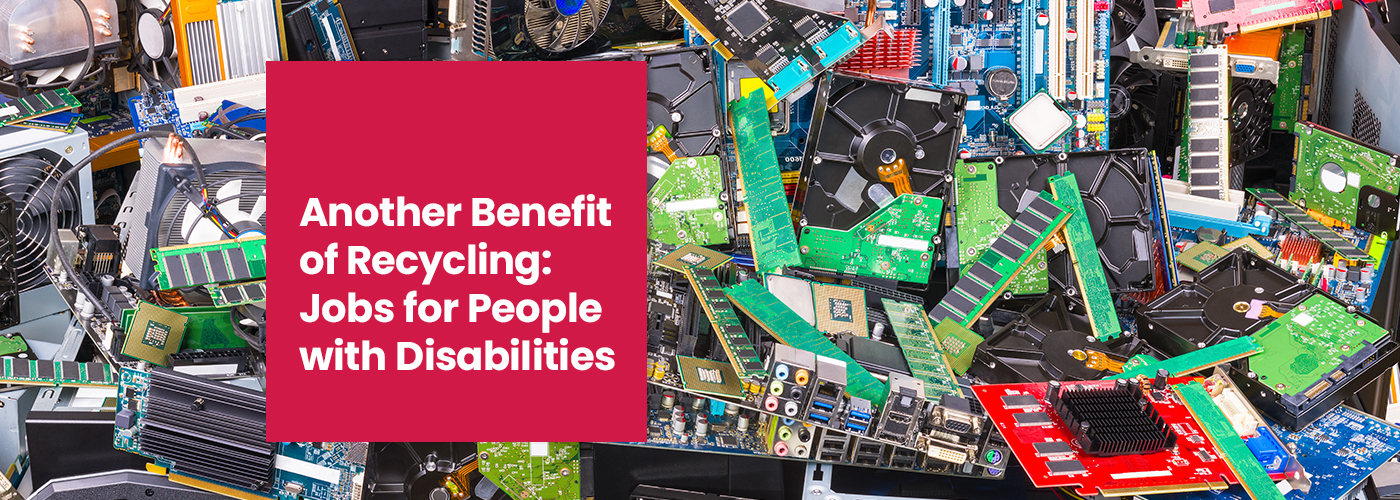Another Benefit of Recycling: Jobs for People with Disabilities

The next time you put out your recycling bin, you should know that you are not just helping create a greener world—you are also helping support the creation of jobs for people with disabilities.
Recycling is fast becoming a new source of employment for people with disabilities, giving them the opportunity to do meaningful work protecting the environment and strengthening communities. Within the SourceAmerica network, 300 nonprofit agencies lead the way in this important effort, collectively employing hundreds of people with disabilities in this growing industry.
Bridges BTC, located in Rockledge, Florida, is one of these nonprofit agencies. For over 25 years, the federal government has trusted Bridges to properly discard of recyclable materials at three federal locations in Florida. Bridges employs nearly 20 people with disabilities who are responsible for ensuring that all recyclable materials are disposed of properly and stays secure. Their jobs include both collection and sorting of the material. Over the past 6 months, Bridges has recycled 524,155 pounds of products.
“A lot of people think recycling is easy,” said Pete Mazza, a project manager at Bridges. “It’s hard. It’s an everyday challenge. When you’re dealing with recycling you are dealing with a lot of challenges, it requires a lot of work and dedication.”
Noah Brackett, an employee with a disability at Bridges, is responsible for sorting the material at these locations. Brackett works quickly and is incredibly detail oriented—two important skills that are needed to get the job done at these sites. On any given day, he works with his team to analyze the number of buildings he will have to work at and ensure that he has enough bins to complete his tasks.
“At Bridges we have a line that separates paper, office waste, and trash, and a separate line for sorting aluminum, plastic, and bottles,” said Mazza. “There’s also an area for separating electrical wire, computers—also known as e-waste. Once the material is sorted, it is recycled. The dynamic process requires a lot of teamwork, communication, and dedication.”
These skills are important across the recycling industry, and people with disabilities are bringing these skills to tackle the growing problem of waste—which is not just an issue at Bridges.
With millions of tons of electronic waste discarded each year, e-waste has become an important part of recycling for communities around the nation and 26 states and the District of Columbia now have e-waste programs. A leader in this effort, Oregon was one of the first states to enact programs that tackles e-waste while also supporting the employment of people with disabilities by requiring public entities to work with a nonprofit agency to discard of certain materials.
Oregon-based Garten Services is a nonprofit agency dedicated to helping people with disabilities by providing jobs and services—including jobs in their e-waste recycling program.
“We receive thousands of tons of electronic materials through our state contract,” said Garten’s Chief Operating Officer William Posegate. “We have a constant load of materials that includes wires, computers, monitors, televisions, flatscreens, keyboards, and mice. We sort and either disassemble and recycle the commodities, or wipe, test, refurbish, and sell the material we receive. In any given month, we sell $40,000 to $90,000 worth of technology. The process is very labor intensive and efficiency is an absolute must.”
Garten Services’ recycling program includes a partnership with a particular school district that engages students through tours in the spring where kids learn what is and what is not recyclable, the power and capability of their choices, and the benefits to the environment, economy, and the individuals Garten serves. Every year, hundreds of kids get a firsthand and very personal introduction to sustainability and the importance of creating jobs for people with disabilities. They also give tours to just about anyone who requests one knowing that a first-hand look at how recycling and e-cycling is handled is the best way to teach.
The benefits of recycling are continuing to grow and offer hope for the future. Thanks to the efforts of nonprofit agencies like these and the dedicated people with disabilities working in the industry, recycling is proving to be an important way to create good jobs for people with disabilities, strengthen our communities, and build a greener and brighter future for us all.